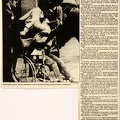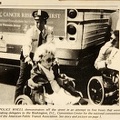THE HANDICAPPED COLORADAN
Volume 7, No. 3 Boulder, Colorado October 1984
PHOTO: A man in a leather brimmed hat, long hair beard and moustache down vest and jeans, seated in a motorized wheelchair (Mike Auberger), leans to his right as he is surrounded by abled bodied people. Back to the camera, a man plain clothes is partially in front of him, papers sticking out from his back pocket. A uniformed officer is also back to the camera and is holding Mike's arm which in front of Mike. A second uniformed officer is doing something behind Mike's back while a woman stands up on the sidewalk to his side watching with her hands on her hips. (She was an organizer with National Training and Information Center and was assisting with the Access Institute.)
cation reads: D.C. Police Arrest Denver Disabled Protestor MIKE AUBERGER, a community organizer for the Atlantis Community in Denver and a member of the American Disabled for Accessible Transit (ADAPT) is arrested by Washington, D.C., police outside the Washington Convention Center where the national convention of the American Public Transit Association (APTA) was just getting under way. A spokesperson for APTA said that the demonstrations only delayed the start of the convention by a few minutes. Inside the convention hall Secretary of Transportation Elizabeth Dole abandoned her prepared text and said the administration was working to provide public transit for the disabled. Outside the hall, demonstrators branded the secretary's plan as another “separate but equal" scheme and demanded that the federal government require all public transit systems be made accessible to the handicapped. Demonstrators not only blocked the entrances to the convention but also surrounded chartered buses that took delegates from their hotel to the convention center. The disabled activists represented a number of cities, including Denver, Syracuse, N.Y., Boston, El Paso, Los Angeles and Chicago. Additional photo on page 4.
28 Busted in D.C.
The 28 disabled activists who were arrested for civil disobedience during the national convention of the American Public Transit Association (APTA) in Washington, D.C., last month are trying to raise $1500 to make their bail money by a Dec. 3 deadline.
At the same time, they're preparing to carry their demand that the APTA members buy only wheelchair-lift equipped buses to the transit organization's regional convention in San Antonio on April 20.
The Texas contingent from the American Disabled for Accessible Public Transit (ADAPT) under the leadership of Jim Parker of El Paso has been especially militant in their demands. Taking their lead from an editorial in the September Handicapped Coloradan, a coalition of of Texas disabled groups met in San Antonio and voted to ask transit systems in Texas to withdraw from APTA unless it goes on record supporting accessibility. The Colorado chapter of ADAPT was planning to introduce a similar resolution to Denver’s Regional Transportation District (RTD).
APTA's position is that accessibility should be left to the discretion of the local transit provider, Although the Carter administration mandated accessibility in public transit, APTA was successful in getting that ruling thrown out in a l98l court battle. ADAPT maintains that the disabled have a civil right to public transit.
Jack Gilstrap, APTA's executive vice president, reiterated that position as wheelchair demonstrators seized buses in front of the White House and hurled their chairs at police lines outside the Washington Hilton and Washington Convention Center during APTA's late September
meeting.
Gilstrap said that the funds just weren't there to support a mandatory
system, adding that the additional burden might jeopardize some transit systems.
However, since the convention ADAPT has been approached by APTA's new president, Warren Franks, the director of the Syracuse, N.Y., transit system, who has requested a meeting in Denver with wheelchair activists.
"The Syracuse ADAPT group has been pretty active," said ADAPT spokesperson Wade Blank. "Franks must be pretty worried about what might happen there if he wants to meet with us.“
ADAPT was organized in Denver one year ago by some of the same groups and individuals who had been involved in forcing RTD to adopt a pro-accessibility policy when purchasing new buses. That battle too was highlighted by militant demonstrations with wheelers chaining themselves to the doors of RTD headquarters.
In contrast, demonstrators restricted themselves to orderly pickets when APTA held its national convention in Denver in 1983. But ADAPT only abandoned its plans for civil disobedience after APTA met its demands to address the entire convention on accessibility.
APTA's national staff fought that request and allegedly threatened to pull the convention out of Denver at the last minute, but finally agreed to allow ADAPT to address the meeting after Denver Mayor Federico Pena intervened. There was no question that ADAPT would be offered the same treatment at the Washington convention. Although they didn't get a spot on the agenda Blank said his group made their point by capturing the attention of the capital's media.
Even before the convention opened, ADAPT made its presence known by
joining forces with local D.C. activists to seize seven Metrobuses and block the five blocks along Pennsylvania Avenue in front of the White House during the afternoon rush hour.
Demonstrators released the buses an hour later when D.C.’s Metro General Manager Carmen E. Turner agreed to meet with Washington disabled leaders to discuss their demands for a fully accessible system. No date has yet been set for that meeting, which ADAPT said marked an historic first in the Washington area.
No arrests were made during that demonstration, although Washington
police moved several demonstrators out of the street.
But on the following Monday and Tuesday 28 demonstrators were arrested as they tried to block buses leaving the Washington Hilton for the convention center and again at the convention center itself.
The police threw up lines as picketers arrived but were unable to halt the advance of the demonstrators, who wedged their chairs in the hall's doors or hurled their bodies onto the ground.
Mike Auberger, one of those arrested, said the police "were abusive -- there's no doubt of that," but he added that this was probably pretty typical. “Let's face it," he said, "these guys probably have to deal with demonstrators all the time." They don't mess around when they get started.
Auberger said he was grabbed by the hair and pulled back so that his chair was resting on its back wheels. Two other demonstrators were thrown from their chairs and taken to local hospitals where they were released after being treated for minor injuries.
Police had to bring in special vans with wheelchair lifts in order to cart demonstrators off to jail, where they were fingerprinted and rushed into court. "Only the doorway between the holding cells and the courtroom was too narrow to get our chairs through," Auberger
said, "so they had to take us in the back way."
Some of the disabled picketers were surprised that the police reacted with such force, according to Auberger. "l think it opened a few eyes," he said.
ADAPT filmed the demonstration, and a 20-minute edited version is being shown as part of a fundraiser to pay the bails of those arrested, about half of whom were from Denver. Congresswoman Pat Schroeder (D-Denver) has agreed tn help raise money, but because of previous campaign commitments said she would be unable to participate until after the first of the year.
- Created on
- Thursday 11 July 2013
- Posted on
- Wednesday 25 November 2015
- Tags
- abusive, Access Institute, ADAPT - American Disabled for Accessible Public Transit, APTA - American Public Transit Association, arrest, Atlantis, blocking a bus, Boston, Chicago, civil disobedience, Colorado, Congresswoman Pat Schroeder, convention center, court, Denver, El Paso, fundraising, inaccessible, Jack Gilstrap, jail, Jim Parker, lifts on NEW buses, Los Angeles, Mike Auberger, NPA/NTIC, police, police barricades, San Antonio, Secretary Elizabeth Dole, separate but equal, Syracuse, Texas, Wade Blank, Warren Franks, White House
- Visits
- 6514
- Rating score
- no rate
- Rate this photo


0 comments